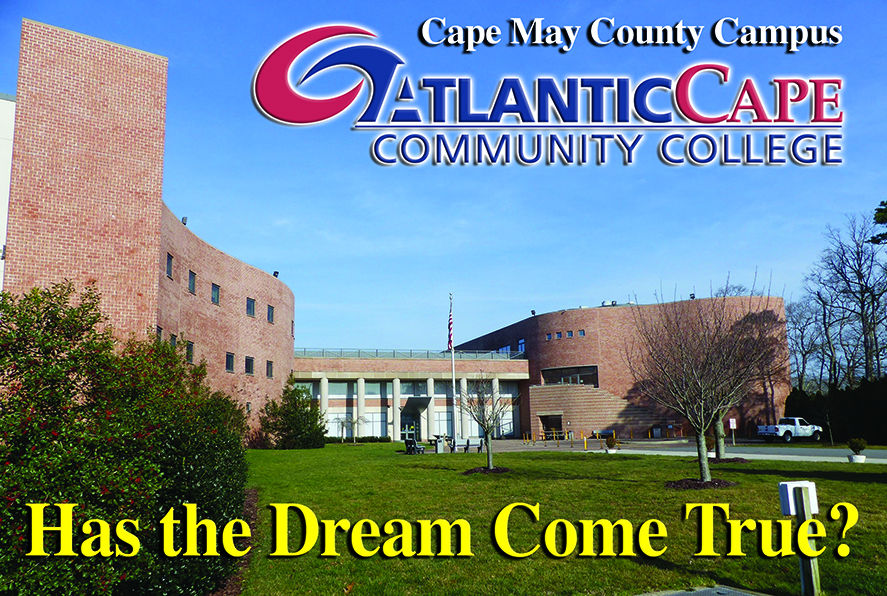This is the fifth in a series that focuses on Atlantic Cape Community College’s decade-old Cape May County Campus.
COURT HOUSE – Workforce development is the component of regional economic development that focuses on the human resources and skill sets necessary for vibrant economic growth. When community colleges began, as two-year junior colleges, they provided access to post-secondary education at a time of explosive enrollment growth. Their focus was on filtering the most academically qualified on to four-year schools. When these largely public two-year institutions began to engage in economic development activities, many limited themselves to occupational education. In the last 20 years or so, much has changed.
Community colleges have increasingly become active in community economic issues. As community governments, state and federal agencies and business groups have tackled the need for sustainable economic growth in a region, academic initiatives became an important tool in the struggle to maintain an appropriately skilled workforce.
Workforce Development
In the region that is southeastern New Jersey, outside the economic sphere of Philadelphia and inside that of an economically deteriorating Atlantic City, it is hard to see what that desirable level of workforce skill should be. At least that is the case for those administrators at Atlantic Cape in charge of workforce issues.
A conversation with Donna Vassallo, dean of Career Education, and Sherwood Taylor, director of Workforce Development and Career Education, made clear an Atlantic Cape strategy in Cape May County focuses on being responsive to existing business and their periodic needs for specialized training.
The numbers they quote sound impressive. They spoke of 5,600 students attending workshops or training programs over the 10 years of the Cape May County campus. They note the fact that such Atlantic Cape programs have been responsive to the needs of 125 different businesses, agencies and organizations in that period. Evaluating the impact of that level of training requires a look at what it is, and what it is not.
As examples, Vassallo and Taylor discussed their work with local banks that seek short, non-credit soft-skill programs like team building, supervisory training, and customer service skills. They explained that the non-credit Health Professions Institute (HPI) runs programs requested by Atlantic Care or Cape Regional medical networks.
Now, for example, they will be running programs for medical billing training because it is an expressed need of their business customers.
What is missing in this description is a broad, innovative approach to the county’s economic development needs, but one could argue an initiative of that sort starts with the county and not the college.
According to Vassallo, Atlantic Cape uses multiple avenues to help determine the training it should offer in this county. They respond to long-term customers, they run focus groups, and they take input from advisory boards associated with various areas of study at the college.
Training programs, when offered, can be paid for in a number of ways. The major sources of funds are businesses with specific needs for training already existing employees or grants for training programs sponsored by the state to bolster skill sets related to specific economic sectors in the state’s economy.
The college can win, or fail to win, such grants by demonstrating the regional economic payoff. That requirement brings one full circle to the linkages that need to exist between the educational institution and the local economy.
Atlantic Cape is and has been involved in workforce development, but its most extended and resource-intensive efforts have been in Atlantic County aimed largely at the hospitality and gaming needs of the casino industry there.
Healthcare programs aimed at the natural gas industry, and others have augmented those related to gaming, culinary arts, and hospitality, but they too have been focused in Atlantic County.
In the last 10 years, academic programs with a career focus have left the Cape May County campus. Workforce programs in the county have largely become responses to paying customers.
When President Dr. Peter Mora was asked during an interview about workforce development in Cape May County, he candidly replied, “If a business there calls us we respond.”
Spring 2016 Offerings
In July 2014, the Atlantic Cape Trustees approved a new structure for academic affairs administration. That move split liberal studies, career education, and science, technology, engineering and math (STEM) into three divisions.
The job description of the new dean of Career Education, Vassallo, is broad and challenging. However, most of the areas of responsibility it covers involve programs not offered in Cape May County.
Many of the most unique career programs at Atlantic Cape require special facilities that were never part of the design of the new campus in Court House.
One can talk of the $6-billion tourism industry locally, but programs like culinary arts require facilities not available here. Others like hospitality were never deemed viable in this county.
Business Administration was pulled from the local campus when it failed to pay for itself. Entrepreneurial studies, which might be attractive in a county of small businesses, is not offered. The reality is that there is little linkage between the liberal arts and general education focus of associate degrees offered in Cape May County and the county’s economy.
Atlantic Cape distributes a 34-page booklet listing the spring 2016 offerings which fall under the heading of “Workforce Development and Career Education.” The booklet is organized by categories of non-credit training programs, degree career programs, and professional development programs.
Under the heading for non-credit, 14 pages of listings, a reader would find the Cape May County campus as the location for a QuickBooks boot camp and a program for massage therapy. The other programs are all listed as located in Atlantic County.
The pages devoted to degree career-oriented programs show courses offered at the local campus, but, as was already covered in an earlier article in this series, career-oriented degree programs cannot be completed in Cape May County.
The new initiative for increasing the access to such programs through video-conferencing technology will begin this fall.
The pattern repeats itself under the heading of Professional Development. Construction Management offerings, those aimed at the New Jersey Real Estate Broker License, grant writing, and non-profit organization courses, substitute teacher certification, and Security Officer Registration Act training all are offered but not at the Cape May County campus.
In short, the local campus is conspicuously absent from page after page of the booklet.
It Was All About Jobs
Sen. Jeff Van Drew, (D-1st) was as instrumental as anyone in bringing a campus to Cape May County. Talking with him last week in his Court House office reinforced the sense that the move to bring the campus here was largely motivated by a desire to improve the economic security of county residents. “It was all about jobs,” Van Drew said.
Van Drew recalled the effort to get an independent community college for the county but admitted that he was agreeable to the state request that the effort be based on a shared arrangement with another county. He recalled the effort to explore a possible partnership with Cumberland County College and the strong opposition from Atlantic County to any move that would endanger Cape May County enrollments at what was then Atlantic County College.
“They saw the prospect of losing Cape May County students as something that would be devastating to Atlantic Community College,” Van Drew said. That comment described the dilemma inherent in the partnership.
Atlantic Cape has always depended on the 20 percent of its enrollments that come from Cape May County residents, but that enrollment has never reached the level where Atlantic Cape administrators saw a variety of program effort as viable at the separate local campus.
The involvement of Atlantic Cape in the economic development efforts at Cape May County Airport may result in a new aviation studies program being located in Erma. We do not yet know if the capital investments required will indeed be made.
As the junior partner in the union of a two-county community college, it is not clear that Cape May County will see much more unless the vision comes from the county itself.
ED. NOTE: Conti has had a 35-year career in higher education as a teacher and senior administrator. Among other roles, he served as Vice Dean of Arts and Sciences at The University of Pennsylvania and the chief operating officer of the University of Maryland University College. He has also worked extensively with Historically Black Universities and Colleges in the U.S. and with institutions of higher education in Europe and Latin America.







